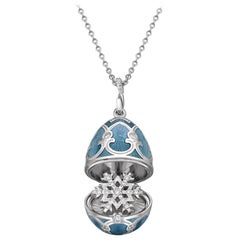Palais Tsarskoye Selo Teal Locket With Snowflake Surprise
Recent Sales
2010s British Pendant Necklaces
White Diamond, White Gold
Fabergé for sale on 1stDibs
While the House of Fabergé is best known for creating the lavishly ornate and intricately devised Imperial Easter eggs given by the last czars to their families as annual holiday gifts, it was the most prestigious Russian luxury goods maker of the late 19th and early 20th centuries.
Serving the aristocracy and the well-to-do through stores in St. Petersburg, Moscow and as far afield as London, Fabergé crafted a wide range of brooches and other jewelry, clock cases, silver and myriad objets de vertu that included picture frames, cigarette cases, cufflinks and carved hardstone floral and animal figurines. Following the revolution, the firm was closed by the Soviet state in 1918.
Master goldsmith Gustav Fabergé, a descendant of Huguenot emigrées, founded the company in St. Petersburg in 1842. The firm did a brisk trade among the lesser nobility and the merchant class, but it flourished under the guidance of Gustav’s eldest son Peter Carl Fabergé — known also as Karl Gustavovich Fabergé — who took over in 1872.
Cosmopolitan, widely-traveled and himself a master goldsmith — he was sent on a Grand Tour in the 1860s — the younger Fabergé drew early design inspiration when he volunteered to catalogue and restore pieces in the imperial jewelry collection in the Hermitage.
Fabergé pieces based on historical jewelry from the Hermitage caught the attention of Czar Alexander III at a Moscow exhibition in 1882, and three years later he commissioned the first Imperial Easter egg as a gift for the czarina. Czar Nicholas II continued the tradition, presenting two eggs each Easter — one for his wife and one for his mother.
Relatively simple in design compared to the complex cloisonné-adorned eggs that followed, the first Fabergé egg was a white-enameled ovoid containing a gold “yolk” that held a gold hen, which in turn contained a replica of the imperial crown from which hung an egg-shaped ruby pendant.
As the appointed goldsmith to the royal court, the House of Fabergé became the darling of Russian aristocrats as well as wealthy patrons across Europe. Many and varied objets — hundreds of thousands by one count — were made to meet their demand. The firm employed some 500 craftsmen and designers when it was shuttered.
After the Russian Revolution, the Fabergé name and trademark endured a checkered passage through the 20th century.
Family members left their homeland in 1918 and set up a new business in Paris that was mainly concerned with repairing and restoring earlier-made wares. The name was adopted by an American fragrance and beauty products maker in the late 1930s, and later authorized by the family in a 1951 agreement. The trademark has been subsequently sold several times, and attached to numerous products including jewelry.
Fabergé pieces are richly redolent of a romantic past, and a source of thorough delight — for connoisseurs, true Fabergé refers to items made in the firm’s brief, golden decades from 1885 to 1917.
Collectors are advised to make a study of Fabergé works in museum collections such as the Victoria & Albert and the Royal Collection in London to gain an understanding of the quality of genuine goods made by the original firm, and then to purchase only from reputable and reliable dealers, such those at 1stDibs.
Find Fabergé eggs for sale and other objects and vintage jewelry on 1stDibs.
Finding the Right pendant-necklaces for You
Whether you’re layering multiple jewelry pieces or opting for a single strand, vintage pendant necklaces are versatile accessories that can elevate your casual wear as easily as they can add a creative flourish to your formal attire.
The earliest jewelry was less about accessorizing than it was about wearers arming themselves with amulets. In Ancient Egypt, some amulets featured a loop so that they could be strung around one’s neck. While rubies have long been one of the few gemstones that can give diamonds a run for their money, members of some ancient civilizations valued the stones from the get-go, donning ruby pendants as well as other stones with the belief that these adornments would bring protection, healing powers or strength. Today, we still wear our charm bracelets and charm pendants around our necks for good luck.
Later, pendant necklaces, like most fine jewelry, were worn strictly by royalty or the upper class and conferred wealth and prestige. This changed over time, thankfully, as wearing jewelry became more widespread, a democratized means of personal expression.
During the 18th and 19th centuries, pendant necklaces evolved from their status as spiritual amulets, but the jewels still carried deep personal significance. Victorian pendants, in particular, were part of the “mourning jewelry” tradition. Wearers would embed their pendants with locks of hair from a deceased loved one as a way of grieving in the wake of a loss. In the case of cameo jewelry, some pendants were even decorated with miniature hand-carved portraits in a detailed raised relief. Today, portraiture is still a characteristic of many of the hand-carved pendant necklaces offered by Italian jewelry house Scala Gioielli.
Luxury fine jewelry brands such as Cartier, BVLGARI and David Yurman offer their own unique interpretations of the cherished accessory, embellishing platinum or gold pendant necklaces with diamonds, sapphires and other stones.
On 1stDibs, find an extraordinary range of vintage pendant necklaces and other necklaces today.
